Dear Fordham Community,
Passover is a festival when Jews remember the bondage of the Jewish people under the pharaohs in Egypt and give thanks for our deliverance. Central to Passover is the Seder—a large feast on the first two nights of Passover at which participants read and recite the Haggadah, which recounts the story of Exodus laden with songs and rabbinic interpretations. During the eight days of Passover, observers of the holiday are forbidden to eat bread or other foods with yeast. Instead, the only grain products we may eat are made with matzoh, a cracker-like unleavened bread. The story goes that in escaping, the Jews did not have time to let bread rise before baking.
Passover is principally celebrated in homes, rather than in synagogues. It is a time when families gather. I have attended seders every year of my life. Growing up, we went to our cousins. Later, my mother hosted our seders. Now we gather either in my sister Wendy’s or our own home. In addition to matzoh, Passover has many special foods that vary across Jewish communities worldwide. Although the word seder literally means “order,” seders in my family are inflected with a certain amount of chaos—a relaxed informality reflecting the joy of being together.
Many have reflected on the larger messages of Passover, including its emphasis on passing down history through generations and the connection we bear to our ancestors. The holiday’s central theme focuses on liberation from oppression through the combined power of human action and divine intervention. It has inspired Jews and oppressed peoples through the centuries.
Philosopher Michael Walzer has identified three elements in the story of the Exodus that liberation movements have looked to through the centuries:
First, oppression has a starting place—a metaphoric Egypt; second, there is a better place—a world that is more just, where humanity is more fully realized; and third, the path to that place lies through the wilderness—a journey which tests our character and resolve.
Whether you celebrate Passover or not, I hope the spring brings joy to your family and progress to the cause of freedom.
Happy Passover,
Matthew Diller, Dean
Fordham Law School
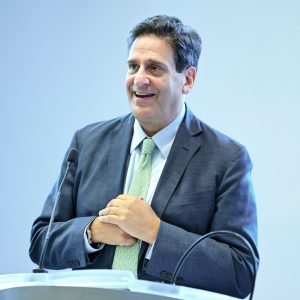
“You’re going to be making decisions from day one about who you want to be, and part of the wisdom that we want to give you today is that being a good and decent person will make you happier,” Tetlow said to about 400 students at the Lincoln Center campus on Aug. 18. “We want you to think about … who you’re trying to be in the world, to never lose sight of that.”
The Professionalism Panel, a time-honored tradition at the Law School sponsored by the Fordham Law Alumni Association, was a unique part of orientation programming for first-year law students. It was the only time that the entire class would gather in the same room besides their graduation ceremony, said the Law School’s dean, Matthew Diller, and a place where they formally take the “Oath of Professionalism” at a ceremony joined by faculty and alumni. But on a deeper level, the event showed the students what it takes to build a meaningful career and life, no matter how they decide to use their degree.

A Personal Reflection From President Tetlow
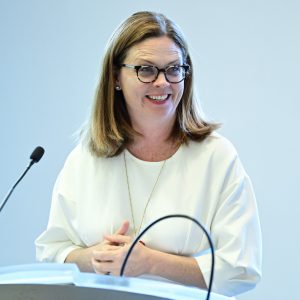
The professionalism panel began with an introduction from Tetlow, who recalled her own experience in the legal profession.
“It was 30 years ago this week that I was starting law school, feeling absolutely terrified and thrilled at the same time,” said Tetlow, who would go on to collaborate on cases with the FBI and lead a domestic violence clinic at Tulane Law School. “There will be 1,000 tiny [decisions]about who you want to be as a professional, and most of all, as a human being.”
To a lawyer, professionalism is more than being polite—it’s acknowledging that lawyers wield enormous power, she said.
“I remember sitting in your shoes, not feeling terribly powerful. But you are, in fact, about to garner a whole lot of power … to do right by your clients, even when you’re really busy and exhausted; to follow the rules, even when it’s tempting not to, and fundamentally … to uphold our democratic systems or to chip away at them,” she said.
‘Look At a Case as a Person’
Tetlow then moderated a panel of accomplished alumni whose careers have taken them to different sectors of the law: Jojo Annobil, LAW ’90, executive director of Immigrant Justice Corps, a nonprofit that trains lawyers to assist immigrants in need; Palmina Fava, LAW ’97, a partner at Vinson & Elkins, LLP, who has tried and defended cases in federal and state courts, including the U.S. Supreme Court; Sam Khichi, LAW ’98, an executive vice president and general counsel at multinational medical technology firm Becton, Dickinson and Company; Hon. Katherine H. Parker, LAW ’92, U.S. magistrate judge for the Southern District of New York; and David Tanen LAW ’96, co-founder and partner of Two River, a venture capital firm that assists life science companies.
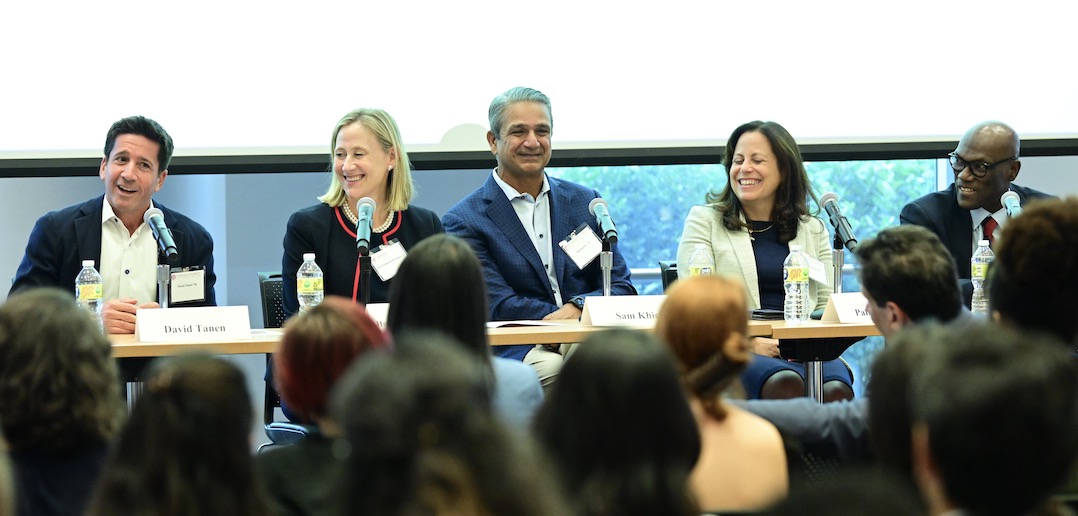
For about an hour, the panelists reflected on their own careers and how their Fordham education has made a difference.
Khichi, an immigrant and veteran who graduated from law school at age 31, said he found a “hardworking, gritty, good” community at Fordham, where he balanced evening classes with a daytime job. He said that the Jesuit values he learned at Fordham helped him to distinguish himself from his other colleagues.
Annobil, a lawyer who has protected immigrants’ rights for nearly two decades, described how his career embodies a Jesuit education. “You look at a case as a person,” said Annobil, who is an immigrant himself. “I try my best to see how I can [meet]that person’s hopes, fears, and aspirations.”
Fava said that her pro bono legal services are inspired by her identity as the daughter of immigrants and a veteran, as well as the mother of four children with different learning styles. “I look at my pro bono service in keeping with those issues, with immigrants’ rights and veterans’ rights [and education],” said Fava. “Those are the ways that I try to channel the things that are interesting to me, that I have some experience with, that I understand, and [where I]can make some changes.”

Personal Advice From the Panelists
In addition, the panelists shared practical advice that can be applied to not only the courtroom, but professions in every field:
Don’t forget to invest in your personal relationships, even when life gets busy. “Relationships really matter, and they’ll carry you when things are tough,” said Khichi. “I can tell you that when things were tough for me throughout my career, it was the Fordham relationships that I made, whether they were with faculty or folks I attended school with, that I relied on for advice.”
Take care of yourself before you help someone else. Otherwise you’ll burn out, said Annobil. He urged the students to exercise, sleep, and to devote time to themselves. “It’s OK to say, no, I can’t take this case because I have too many things going on in my life right now,” he said.
Put yourself in another person’s shoes. Tetlow asked the students if they had ever had to engage with a lawyer or knew someone who did. Half of them raised their hands. “Remember that feeling of hoping your lawyer is going to return your call, of hoping that they are prepared, that they actually care about you and your case,” she said. “It wasn’t until I was 40 that I actually had to hire a lawyer for something. It was a very humbling experience.”
Don’t be afraid to admit when you don’t know something. Be truthful when you don’t have a fact or case at your fingertips, said Judge Parker. “Be able to say, ‘I’m not sure about that. I can get back to you tomorrow in a letter,’ or something like that.”
Don’t underestimate the power of EQ. “Someone’s ability to get along with others is just as important, if not sometimes more important, than their pedigree of service,” said Khichi.
Treat all people with respect—including your adversaries. Judge Parker said she asks people for their pronouns and honorifics, checks to see if they require accommodations, and encourages firms to allow their junior associates time to talk. She also said that it’s important to be courteous to your adversaries in the courtroom. “There’s a belief that some lawyers have that in order to be aggressive and zealous in representing your client, that means being a jerk to your adversary, and that’s not the case. You can be very effective, but still be cooperative,” she said.
Be prepared to pivot. Tanen said he always wanted to be a criminal defense attorney. When that career path didn’t work out, he was devastated, but he later found another opportunity and went on to co-found several companies. “Fordham teaches you to be a gritty attorney,” he said. “There is no job too big. There is no job too small.”
]]>While Fordham Law School was founded to serve people who had traditionally been excluded from the legal field, “we have significantly more work to do … to truly ensure that all of our students, particularly those from underrepresented communities, experience a learning environment that is supportive and free from bias,” Matthew Diller, dean of the law school, said in an October 2020 statement.
Among many other efforts, the school expanded its Increasing Diversity in Education and the Law (IDEAL) program, a pre-law program for New York-area college students from diverse backgrounds. In August 2021, the school launched its Realizing Excellence and Access in the Law (REAL) Scholar’s program to provide peer advising, mentoring, a pre-orientation program, and other support to first-year law students from underrepresented groups.
The law school also brought in consultants for in-depth surveys that informed new diversity, equity, and inclusion (DEI) efforts across the Fordham Law community.
These initiatives were enabled by benefactors including David Tanen, a 1996 Fordham Law graduate who has been a member of the Dean’s Planning Council and given back to the law school for more than a dozen years, making philanthropic investments to enhance its educational environment.
His experience at Fordham Law continues to enrich his life, he said, because of the friendships, connections, and skills he gained there. A native of small-town Nahant, Massachusetts, he initially pursued a legal career by majoring in criminal justice at George Washington University in Washington, D.C.
He came to Fordham Law wanting to be a criminal defense attorney, but pivoted after graduation to work in the life sciences industry. Today, he is a partner with Two River, LLC, a venture capital firm in New York City that he co-founded in 2004. He has been a cofounder, officer, and director for a number of the firms incubated by Two River, including Kite Pharma, Inc.
Tanen has made major gifts in support of the law school’s diversity efforts, helping to advance a key priority of Cura Personalis | For Every Fordham Student, Fordham’s campaign to raise $350 million for enhancing the student experience across the University. And he previously provided funding for six professionalism fellows, upper-level law students who promote mentorship, professionalism, and inclusion among students as part of the law school’s “house” system. Begun in 2019, the house system sets up communities of faculty, alumni, student advisers, and others to provide support and guidance for students.
Discussing his reasons for giving back to Fordham Law, he cited the collegial school character that he experienced as a student, as well as the law school’s culture that makes change and progress in anti-racism efforts a realistic aspiration.
How did your giving in support of diversity efforts at Fordham Law come about?
It was shortly after the murder of George Floyd that I met with Dean Matthew Diller and Assistant Dean Vera Tkachuk, and we were talking through some of the initiatives that they wanted to implement. Of particular note was an Instagram account called Black at Fordham Law, which highlighted some of the concerns about discrimination. Dean Diller was understandably concerned about the student experience at Fordham Law and recognized that this is an issue that needed to be addressed and addressed quickly. Fostering a more inclusive community where people from all backgrounds feel that they are welcome is important, not just for the law school but for all academic institutions and professional environments. This was something that resonated with me.
This was a seismic event—a cultural shift. There are challenging conversations to be had. My aim was to help provide resources to the law school so they could implement programs and facilitate those discussions.
Has your own work shown you the importance of DEI efforts?
Absolutely. Having an understanding of different perspectives can only provide for a better experience in the classroom and in the conference room or boardroom. For a long time, boards were dominated largely by white men, but we have initiated efforts at our companies to expand diversity at the management and board levels.
Moreover, our portfolio companies research and develop novel therapeutic technologies intended to address unmet medical needs, primarily in oncology. In drug development, ensuring people from diverse backgrounds join clinical trials is key to advancing health equity. Participants in clinical trials should represent the patients that will use the medical products. This is often not the case—people from racial and ethnic minorities and other diverse groups are underrepresented in clinical research. This is a concern because people of different ages, races, and ethnicities may react differently to certain medical products. The Food and Drug Administration encourages diverse participation in clinical trials.
Tell me about your support for the house system and the professionalism fellows.
The house system is a unique way of providing support to students. It creates a smaller community within the larger Fordham Law School community that promotes mental health and well-being and teaches some of the softer skills that aren’t taught in the classroom, and which are important to developing legal skills and critical thinking. Being solution oriented, communicating effectively, and working collaboratively are vital skills that are necessary for being a successful attorney and a better advocate. The professionalism program helps develop these skills. It also helps develop extra-legal skills that may be necessary, like financial literacy, but that are also useful in your professional and personal lives, such as cross-cultural understanding.
Have you faced a career challenge that offers a lesson for today’s students?
Growing up, I knew that I wanted to go to law school and focus on criminal law. As an undergraduate, I majored in criminal justice and at Fordham I focused primarily on criminal law classes and joined Fordham Law’s first trial advocacy team. Following graduation, however, I was unable to secure a position at any of the district attorney’s offices in New York. That’s when one of my classmates from Fordham Law reached out to me about an opportunity to join a boutique life science venture capital company. At the time, I wasn’t sure what a boutique life science company was. Nonetheless, disappointed with the failure to secure a position in criminal law, I decided to pivot to the corporate world, and it changed my life in meaningful ways.
Since then, together with my partners, we have built a number of successful biotechnology companies, created thousands of jobs, driven meaningful value for investors, and most importantly, brought life-saving therapies to patients who desperately need them. Venture capital was never a vocation that I had envisioned for myself. I always saw myself cross-examining someone in a courtroom rather than negotiating a contract in a conference room. The experience helped me to understand that when life presents you with challenges, you need to be flexible and take advantage of opportunities when they’re presented to you. It’s like the old adage goes—when life give you lemons, make lemonade.
This concept of adapting to change is nicely presented in a book I found influential—Who Moved My Cheese?, by Spencer Johnson. It’s about what you do when that “cheese” you’ve been chasing—in my case, being a criminal law attorney—is no longer there. I had to face my fears—“Okay, what do I do now? This is what I’ve built myself up to be over the last 24 years. Now, what am I? Where am I? How do I address this?” The lesson I learned is that you have to be open minded, you have to be flexible, and be ready to pivot to a new opportunity when it presents itself.
How did your Fordham Law education help you in this transition?
One of the things that I appreciate about Fordham Law is that it teaches you how to practice the law. At some other schools you learn about the philosophy of law, which is also important. However, with my Fordham Law education, I felt I was well prepared to practice as a criminal law attorney, and I was able to bring those same practical skills to a corporate law environment as well.
What’s a highlight from your student experience at Fordham?
Overall, I had a great experience at Fordham Law. Coming into law school, we had all watched The Paper Chase and read One L by Scott Turow and feared a cutthroat environment where students would tear cases out of the books or steal your notes in order to gain an advantage. I had just the opposite experience. Our class was very collaborative and cooperative. That culture, the openness and the friendships that I’ve built and keep to this day, are some of the highlights of my Fordham Law experience.
Looking at the world today, what are you optimistic about?
I’m optimistic about my children and their future—not just my children, but their generation. I think that it’s a much different generation than when I grew up. They are more accepting of other cultures, sexual preferences, and gender identifications. America is still a very divided country, but I hope that the younger generation can bridge these issues and we will get past some of these challenges.
I’m also optimistic about the law school. I am very happy with the direction and leadership of the deans and faculty. It’s the professionalism program, the DEI programs, the willingness to not only listen to the concerns that students have, but also address them, and to foster an environment where people feel comfortable expressing their views. Fordham is helping students not only to become successful professionally, but also to cultivate critical “soft skills” and demonstrate resilience.
The approach is clearly working—I recently learned that 94% of 2021 graduates are employed, which ties the school for No. 15 in the country. Also, last year’s incoming class had very strong scores, a 166 median on the LSAT and a median GPA of 3.7. And the school is ranked in the top 30 across 10 programs, from trial advocacy to criminal law and beyond, so the school really has amazing breadth.
What’s kept you involved with Fordham Law over the years?
Fordham Law’s motto is “In the service of others.” The law school has helped me in countless ways, and so it’s rewarding to be able to give back to the law school and its students, and hopefully they feel the same way.
To inquire about giving in support of diversity, equity, and inclusion efforts or another area of the University, please contact Michael Boyd, senior associate vice president for development and university relations, at 212-636-6525 or [email protected]. Learn more about Cura Personalis | For Every Fordham Student, our campaign to reinvest in every aspect of the Fordham student experience.
]]>“I do truly believe one thing, and that is we only make progress by listening to each other and by learning from each other and that we should do that across every apparent divide: jurisprudential, political, you name it,” she said.
Read the full story in Fordham Law News
]]>On Feb. 6, 2017, Fahimeh (Farimah) Kashkooli, LAW ’17, made her way with a Fordham Law contingent to John F. Kennedy Airport, where her 12-year-old daughter Alma was scheduled to arrive for desperately needed medical treatment.
Alma, who suffers from a rare congenital disorder of glycosylation or CDG, was supposed to undergo surgery on Jan. 23 in Pittsburgh, but her trip was held up, first by bureaucratic delays and then by the executive order signed by President Trump on Feb. 1 barring entry from six predominantly Muslim countries, including Kashkooli’s native Iran. Without the surgery, there was a risk that Alma could go blind.

Fordham Law Dean Matthew Diller, Assistant Dean Tom Schoenherr, and Gordon Caplan, LAW ’91, of Willkie Farr & Gallagher, were able to help Kashkooli secure Alma’s admission into the country, and in March, she underwent medical treatments in New York that stabilized her condition.
Kashkooli currently lives in Manhattan with Alma. Life is less chaotic than it was a year ago, but the experience still brings her to tears. Because Alma’s father and nanny were denied visas at the time, and she didn’t know whether she’d be able to return to the United States if she flew home to retrieve Alma, she had to rely on Shaimaa Hussein, an associate at Willkie Farr, to fly to Istanbul and escort her on the flight. When Alma’s father attempted to hand her off to Hussein, airport authorities balked. Kashkooli, who was on the phone in New York, could only offer encouragement as he tried to get Alma on the plane.
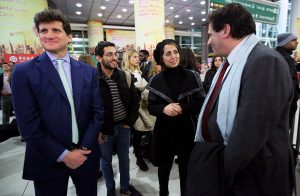
“They found a boy on the airport staff, and they said to him, ‘Take this wheelchair. See the child in that side of the gate? Put the child in, and bring her here. Quickly, because there’s no time. They are just boarding to the plane,’” she said.
“My husband was in tears. I said ‘Don’t worry, things are going to be okay, I know this attorney, she will manage it.’”
Kashkooli had been bringing Alma to the United States for treatment since she was born. Her diagnosis at the Mayo Clinic was first of its kind for her disorder. Since then, other children with the same disorder have received similar treatments.
Kashkooli enrolled in Fordham Law’s LLM program because she wanted to make the most of her time while Alma was here for treatment, she said. When the travel ban went into effect, she was just beginning of her second semester.
Though reticent at first, she reached out to Fordham Law Clinical Professor Chi Adanna Mgbako and Assistant Dean Toni Jaeger-Fine, who connected her to the dean. Hudson Freeze, Ph.D., director of the Human Genetics Program at the Sanford Children’s Health Research Center in La Jolla, Calif, vouched for Alma, and New York Senator Kirsten Gillibrand intervened to grant her passage.

“I realized then, ‘I’m in good hands, I can trust these people; they’re not going to leave me alone.’ That was the moment I thought, ‘I’m a part of the Fordham family’,” Kashkooli said.
Since her arrival, Kashkooli has secured a new medical team for Alma and enrolled her in school. Kashkooli currently interns at the New York City Supreme Court and is searching for a full-time job that will allow her to obtain a green card once her student visa expires on July 2018.
She wants to stay, to get Alma the best treatment and to put the skills she gained from her law classes to use, but it’s not clear that they will be granted extensions of their visas. It’s hard not to be bitter about the prospect of leaving, she said, particularly since she chose to focus on international law and justice, an area of jurisprudence in which the United States has historically been respected.
“When the time comes [that]I have to leave, I will respect the rules, and I will go. I’ll try to find another solution for my child–but with tears in my eyes,” she said.
“I don’t want to focus on the negative side, though. I got my degree, I got to know all these beautiful people, I got to experience New York City, and Alma’s condition improved. We have a long way to go, but I’m just trying to convince myself that good days are on the way.”
]]>But the men were reading about civil rights movements beyond the prison’s walls. They were reading about George Jackson, the African-American activist and author who attempted escape from a California prison and was killed. The men wrote letters, too, and they were hurt that the government ignored their cries for help. On Sept. 9, 1971, they took control of the prison, and for four days they attempted to negotiate better conditions.
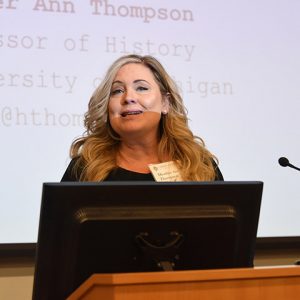
Heather Ann Thompson
On Nov. 1, Fordham welcomed Heather Ann Thompson, who spoke about her book Blood in the Water: The Attica Prison Uprising of 1971 and Its Legacy, which won the 2017 Pulitzer Prize for history. Thompson and a panel of legal experts and civil rights champions discussed how the legal system responded to the uprising and how the uprising illuminates current incarceration issues. The event, part of the A2J Initiative at Fordham Law, was hosted by the School’s Stein Scholars, Stein Center for Law and Ethics, and Center for Race, Law and Justice. Fordham Law Dean Matthew Diller was inspired to organize the event after reading Thompson’s book. “It spoke to me in so many ways that I thought, we must have Heather Thompson at our school,” he said.
“Out of this completely chaotic and unpredictable moment comes, I would argue, one of the most extraordinary human rights stories in American history,” said Thompson, who is also a professor of history, Afroamerican and African studies, and social theory and practice at the University of Michigan.
The state’s response to the uprising was inhumane. Troopers and correction officers were sent across the state to the prison, and, Thompson explained, weapons were passed out to them like candy. They wanted Governor Rockefeller to come to the prison and persuade the men to surrender without legal or physical ramifications. Rockefeller, however, had no intention of visiting and had every intention of taking the prison by force. The troopers and officers dropped gas over the prison and, once the men inside could not stand, they stormed into the building and began shooting.
In the aftermath of the chaos, the state chose not to tell the truth, Thompson said. Government officials pinned the blame on the prisoners, prosecuting them and persecuting them via public media.
Eventually, due to pressure from civil rights activists and attorneys, the prisoners achieved some victory: The state, Thompson explained, ultimately appealed an important jury verdict on behalf of the prisoners. It was “the closest to justice that could probably be had,” she said. She revealed, however, that the public still doesn’t know half the story, as the government continues to hide key documents about the historic event.
Following her talk, Thompson joined a panel discussion Soffiyah Elijah, executive director of Alliance Families for Justice; Elizabeth A. Gaynes, president and CEO of the Osborne Association; and William Hellerstein, professor of law emeritus at Brooklyn Law School. The panel was moderated by Caroline Hsu ’09, a Stein Scholars alumna who is now staff attorney at the Legal Aid Society’s Prisoners’ Rights Project.
The panelists addressed how dismal and racist conditions still exist in American prisons.
“We have the same latent racism emanating, showing its ugly head again,” said Hellerstein.

Soffiyah Elijah
Elijah shared that a popular tattoo among guards in upstate New York is a black baby on a noose. She also showed a video of guards abusing a nonresistant black prisoner and dragging him across the floor while medical professionals watched silently. Such behavior is common in prisons, Elijah noted, except that, usually, it is not recorded and the prisoner ends up in solitary confinement for allegedly assaulting officers.
“People go to extraordinary lengths to make sure that law enforcement is not held responsible,” said Thompson. She revealed that, during research for her book, she was most surprised to learn not only how traumatic the uprising still is for those involved, but also how deep the state attempted to cover up the truth of those historic days. Thompson noted, for example, secret meetings held by Rockefeller.
Today America has more people in cages than anywhere else on the globe, Thompson noted. She called for everyone, no matter her profession, to work in justice’s name.

A Stein Scholars exhibit presented a mock desk for civil rights attorney William S. Kunstler, with information about the Attica Prison uprising of 1971
Before the event, Stein Scholars Leanne Fornelli and Milan Sova created a mock desk display centered on William S. Kunstler, a well-known civil rights attorney who defended a prisoner charged with killing a guard during the riot. People were able to learn more about the riot by sifting through papers atop the desk and in its drawers. The display highlighted issues of access to justice arising from the Attica Prison Uprising.
—Carrie Johnson
]]>Brennan, who served as C.I.A. director from 2013 to January 2017, participated in an hourlong conversation with Washington Post columnist and best-selling author David Ignatius to mark his Center on National Security fellowship. Earlier in the day, Brennan met with Fordham Law faculty and taught two classes.
Brennan’s fellowship is consistent with Fordham Law’s commitment to training students to engage with national security issues in the intelligence community, law enforcement, and government, and the Law School’s long tradition of public service, Dean Matthew Diller said in his welcoming remarks. Diller praised the Center on National Security, a nonpartisan educational think tank directed by Karen J. Greenberg, as the “centerpiece” of the School’s internationally recognized efforts in the field.
“When we spoke several months ago, Director Brennan explained to me the urgency he feels about educating the next generation—and the public more generally—about the role of the United States as a beacon of democracy and freedom around the world and the challenges we face,” Diller said. He also highlighted Fordham University’s strong contributions to the intelligence community, both in the form of Brennan and William J. Casey, a 1934 Fordham University graduate who served as CIA director under President Ronald Reagan.
Brennan spent 33 years in public service and worked under six presidents—three Republicans and three Democrats—prior to coming to Fordham Law. He observed that the tone coming from the Trump White House is “inconsistent with what this country is all about and the signals we should be sending to the global community.” Further, he declared the justifications Trump offered last week for not certifying the Iran Nuclear Deal were “either willfully ignorant on the issues or willfully misleading.”
Trump’s decisions to reject the previous administration’s agreements—on the Iran Deal and others such as the Paris Agreement and Trans-Pacific Partnership—have longtime U.S. allies and partners questioning the value of America’s word and lamenting that Trump’s America First policy strategy actually means “America first, second, and third,” Brennan said. Meanwhile, U.S. adversaries such as China and Russia are eyeing new opportunities to step into the leadership void. Trump’s anti-Iran Deal stance also lessens the likelihood North Korea would make a nuclear deal with the Trump administration, or any subsequent administration, because it sees that deal could be ripped up as soon as the new president arrived, Brennan explained.
Brennan also called into question the wisdom of Trump’s use of Twitter to taunt North Korean dictator Kim Jong-Un, and estimated the likelihood of military conflict between the U.S. and North Korea at between 20 and 25 percent. He cautioned that this did not necessarily mean the situation would turn into a nuclear conflict, and added that he hoped the Trump administration used available back channels to come to a peaceful resolution.
“Thank our lucky stars for Defense Secretary (James) Mattis and (Secretary of State) John Kelly and Chairman of the Joint Chiefs of Staff Joe Dunford,” Brennan said, calling them “governors on the instincts and impulsivity of the president.”
Earlier this year, Brennan criticized Trump for denigrating the intelligence community and questioning its integrity in the wake of public reports that Russia interfered with the 2016 presidential election. Brennan reiterated on Wednesday that the C.I.A. knew in the summer of 2016 that the highest levels of Russian government, under the direction of President Vladimir Putin, had launched a campaign aimed to undermine the election with the goal of enhancing Trump’s prospects.
Brennan recalled an August 4 conversation with Alexander Bortnikov, director of the Russian Federal Security Bureau, in which he warned his counterpart that interfering with the election would backfire and be met with outrage from the American people. In hindsight, Brennan reflected that this was a bad analysis on his part because it seems like many people aren’t concerned about election tampering.
Whether American citizens realize it or not, cybersecurity remains a substantial threat from state and non-state actors, Brennan said. As C.I.A. director, Brennan called for the United States to establish a major independent commission to answer how the nation intends to protect itself from cyber threats and to debate how best to balance security threats with civil liberties. He envisioned this commission to be the cybersecurity equivalent of the Manhattan Project.
“I am hoping we’re not going to wait for a 9/11 equivalent in cyber to take the steps that are necessary,” Brennan said.
In his role with Fordham Law, Brennan will contribute his expertise and insights as a leading practitioner in national security to the Center on National Security’s mission of bringing to public attention issues of national security, foreign policy, governance, and the rule of law. He will participate in conferences, workshops, and other events hosted by the center.
He also plans to serve as a mentor to students who wish to know more about government service and professional opportunities in the field of national security.
“For the way the center has evolved over the past years, always trying to open up a conversation for the people who are most thoughtful, most in front on these issues, most responsible for what happens in Washington and around the world, and most generous with who they are as human beings, he makes perfect sense here,” Greenberg said during her introductory remarks.
—Ray Legendre
]]>“The cyber age is changing not only our technical world but how we think about who we are. And we’re not sure where this revolution is going,” he said. “We must be careful not to allow this revolution to become what is known as the bypass age.
“We can’t allow the Internet to bypass the concept of who we are, what our heritage is, and what our destiny is. And that destiny and that heritage are to preserve and transmit freedom to the next generation.”
Justice Kennedy also spoke about the discrete characteristics—“the intangibles”—that make a law school great and how Fordham fits those criteria.
“You can sense that, you can see that, you can feel that, you can be inspired by that here at Fordham,” he said. “Congratulations to you—the alumni, the faculty, and the students for your dynamic commitment to preserving the tradition and the mission and the meaning of the law.”
Before presenting Justice Kennedy with the award, Dean Matthew Diller spoke about the justice’s celebrated history of opinions, which according to the dean have long resisted procrustean categories.
“Pundits and media types have tried for decades to pin ideological labels on Justice Kennedy. But his thoughtful, nuanced jurisprudence eludes facile designations,” Dean Diller said. “In perusing some of the many majority opinions he has written, one realizes that he cannot be tied to reductive political descriptions of right or left, conservative or liberal, radical or traditional. Justice Kennedy views his mission as nothing more and nothing less than embracing the values of our Constitution and its promise of liberty and justice for all.”
Justice Kennedy is the eighth member of the Supreme Court to receive the Fordham-Stein Prize. Other Supreme Court awardees have included Ruth Bader Ginsburg, William H. Rehnquist, and Sandra Day O’Connor. Justice Kennedy was nominated to the Court by President Ronald Reagan and confirmed in 1988. Prior to his Supreme Court tenure, he served as a judge in the Court of Appeals for the Ninth Circuit. At the time of his appointment to that court, he was the youngest appellate judge in the United States and the third youngest in history to be appointed to a federal appellate bench.
In concluding remarks, Joseph M. McShane, S.J., president of Fordham University, reflected Justice Kennedy’s language about the ineffable qualities that lead to excellence.
“What are the intangibles that have made for greatness in your career?” he said. “Brilliance … balance, judgment, a willingness to listen—not to be a prisoner of prejudgments or prejudices or things as they simply are. You are willing to dialogue with texts, contexts. … These are intangibles that have made you one of the greats.”
]]>“My message is we need to close Rikers Island and we need to close it now, and we need all of your support,” Judge Lippman told the packed crowd of judges, prosecutors, legal scholars, and prison reform activists who convened at the all-day conference, Mass Incarceration: Mercy Matters. The conference was presented by the Franklin H. Williams Judicial Commission, named after the influential 1945 Fordham Law graduate who successfully argued the Groveland case, involving the wrongful conviction of three African-Americans, before the United States Supreme Court. The commission was established in 1991 to educate and advise decision makers in the New York Court System on issues affecting both employees and litigants of color and now comprises over 250 members of color of the New York judiciary.
Lippman’s remarks came during an afternoon panel moderated by David Udell, director of the National Center for Access to Justice (NCAJ) at Fordham Law, titled “The Rikers Report: Reversing the Criminalization of Poverty.” The conference also featured panels on “Mass Incarceration and the Effect on the Community” and “Prosecution of Cases, Racial Bias, and Efforts to Reform the Prison System,” the latter moderated by Fordham Law Professor Tanya K. Hernández.
Glenn E. Martin, president and founder of JustLeadershipUSA and a member of the independent commission, delivered a keynote speech in which he described his own experience in Rikers and the path that led him to his present role as a leader in the movement to close the troubled prison.
Fordham Law Dean Matthew Diller, the Hon. Richard B. Lowe III, chair of the Franklin H. Williams Judicial Commission, and the Hon. Janet DiFiore, chief judge of the New York State Court of Appeals, each shared introductory remarks. Diller praised the Franklin H. Williams Judicial Commission’s commitment to equal justice and fairness, celebrated the life of the commission’s namesake, and spoke about Fordham’s commitment to access to justice.
In fall 2016, Diller, Lippman, and Udell launched Fordham Law School’s Access to Justice Initiative. The Rikers Report panel was the third public discussion hosted by the initiative in the past year at Fordham Law in which NCAJ has sought to highlight the web of connections that link poverty, racial justice, the civil justice system, the criminal justice system, and the access-to-justice movement.
Much of the panel’s discussion focused on the fact that innocent people are held in Rikers because they lack sufficient funds to “purchase their freedom.” The panel exchanged views over the report’s recommendations for eliminating money bail altogether, establishing charitable revolving bail funds, relying on technology to determine dangerousness, and eliminating adjournments that have caused people who can’t make bail to languish in Rikers for extended, and often open-ended, periods of time.
Lippman told the audience that he had three requests before he had accepted the position of chair of the independent commission. He asked that the commission 1) be funded privately so there was no potential claims of government interference, 2) be populated by a broad spectrum of society, and 3) could “call it the way we saw it.”
“We understood within the first six months of our operation that mass incarceration just doesn’t work,” Lippman said. “This idea of putting people out of sight and out of mind promotes a culture of violence, brutality, and inhumanity.”
The 97-page Rikers report, A More Just New York City, prompted New York City Mayor Bill de Blasio’s vow in late March that he would close the jail complex. Whether Rikers closes in 10 years or much sooner ultimately depends on public officials showing some courage, Lippman stated.
Among the independent commission’s recommendations:
Basic criminal justice reform is needed to reduce the population of Rikers from around 10,000 to 5,000. This includes elimination of money bail and assurance of a speedy trial, renewed investment in youth, diversion of low-level misdemeanors from criminal courts, expansion of services for the mentally ill, and decriminalization of certain non-violent offenses.
Jails should be smaller, closer to the community, and closer to the inmates’ families. If jail populations around the city drop, then that would make it possible to house inmates in more central locations, such as a building attached to a courthouse, and hire fewer correctional officers.
Turn Rikers Island into an economic growth hub. If Rikers were closed, the island could house an extension for LaGuardia airport, have water treatment and solar power facilities, and affordable and commercial housing—all of which could create tens of thousands of jobs.
Build a memorial on Rikers Island. Such a monument would educate future generations about the brutal violence that took place there.
Fordham Law Professor Tanya Hernández moderated the day’s final panel, “Prosecution of Cases, Racial Bias, and Efforts to Reform the Criminal Justice System.” The panel included Bronx County District Attorney Darcel D. Clark, acting Kings County District Attorney Eric Gonzalez, Yale Law Professor Anna VanCleave, and Anthony J. Annucci, acting commissioner for the New York State Department of Corrections and Community Supervision.
—Ray Legendre
]]>The School also recognized Kirpalani with a 2017 Louis J. Lefkowitz Public Service Award. Both honors celebrate Kirpalani’s generosity in funding programs that support the School’s students interested in pursuing public interest law. Through a leadership gift and significant bequest, he established the Kirpalani Scholars program, which provides full annual scholarships for four students, and he also underwrites summer fellowships for students through the School’s Public Interest Resource Center.
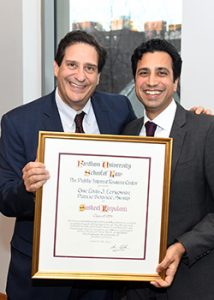
As the gateway to the Fordham Law School building, which opened in 2014, the Kirpalani Commons provides a gracious welcoming space for visitors and members of the Law School community. At the base of the building’s soaring two-story entryway, the Kirpalani Commons serves as both a student lounge and a showcase—through digital displays and display cases—for the School’s current events, its history, and the achievements of its faculty, students and alumni.
Present at the dedication were Quinn Emanuel Urquhart & Sullivan named partners Kathleen Sullivan and Bill Urquhart ’78, as well as partners Peter Calamari ’73, Benjamin Finestone, James Tecce, and Richard Werder.
“Susheel Kirpalani has made a philanthropic investment in Fordham Law students that will make a difference in not only their lives and careers, but also in the lives and futures of the people they help through public interest legal work,” said Fordham Law Dean Matthew Diller.
Though Kirpalani has found resounding success in his career—working on high-profile bankruptcy cases involving Enron, Lehman Brothers, and the City of Detroit—he says that his own consideration of public service work after law school was curtailed by practical realities.
“Unfortunately public service work was not something that I was able to do with my education given my financial situation,” Kirpalani says. “However, now I can use my resources to help other students pursue public service careers, and that’s something I want to make happen.”
He sees his contributions to Fordham as a way to further his interest in the public good, while also helping ensure the School’s future.
“If I give a dollar to a person who is going to work their entire life for such causes, how many people are there in their life that they’re going to help and that they’re going to impact?” he says. “It’s a great way to leverage your money for the greater good.”
]]>Approximately 140 Judge Calabresi admirers, including many of his judicial colleagues from the United States Court of Appeals for the Second Circuit, gathered at the Law School to honor a man who generally eschews professional honorifics.
“The first thing to understand about Judge Calabresi is that no one calls him that,” said Dean Matthew Diller. “He is known, plainly and simply, as Guido. … Only a few people throughout history have been able to pull off a successful mononym, and none of them—not Madonna, not Cher, not Plato—compares to Guido.”
Dean Diller extolled Judge Calabresi’s historic impact on the legal profession in his multifaceted roles as legal scholar, Yale Law professor, Yale Law dean, and federal judge.
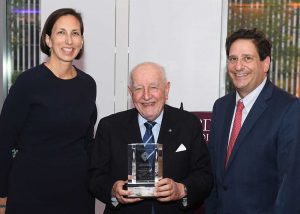
Photo by Chris Taggart.
After clerking for Supreme Court Justice Hugo Black, Judge Calabresi joined the Yale Law faculty in 1959 and two years later became the youngest-ever full professor at the school. In 1985, he became dean and helped turn a financially shaky Yale Law into a well-funded, national powerhouse. Judge Calabresi was appointed to the Second Circuit court in 1994.
In his remarks following his acceptance of the prize, Judge Calabresi spoke about how his academic pedigree informs his judicial behavior. He defined the term “academic judges” to describe scholars like himself who are later elevated to the bench.
“Properly, academic judges are people who think that our job is to be part of lawmaking together with a lot of other institutions—to talk,” he said. “To talk to the legislatures…to talk to the states…to talk to the agencies, and to talk to the academy…and, together with all those, slowly introduce things which bring the law forward and make it better.”
As the Sterling Professor Emeritus of Law and Professorial Lecturer in Law, Judge Calabresi still teaches a course on torts at Yale Law every semester. His 1970 book The Cost of Accidents transformed the study of torts from a fault-finding venture into a strict-liability enterprise. Scholars have said that this publication and other torts scholarship by Judge Calabresi contributed to the development of no-fault insurance.
A widely beloved figure who is known as much for his personal warmth and compassion as he is for his intellectual output, Judge Calabresi was alternately playful and serious in his comments at the dinner.
“To come up with crazy ideas—that maybe is the most fun that I have as an academic judge,” he said. “To come up with ideas that are really strange and then to say, ‘Please brief these.’ But to know that these crazy ideas are to be thrown out, to be made part of a discussion, and then often to be ignored.”
At the end of his address, Judge Calabresi, who had earlier in the day met with Fordham Law students to answer their questions about his career and the federal judiciary, sounded a heartfelt note of gratitude for the praise he had received about his lifetime of achievements.
“I am particularly happy about the things you all said about me because I try to do that and to do it in a way that respects the values that a place like this, whose values I share, embodies in all that it does,” Judge Calabresi said. “For that, which makes this evening for me one of the truly great evenings of my life, I thank you more than I can say.”
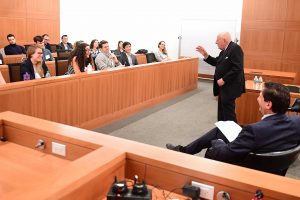
Photo by Chris Taggart